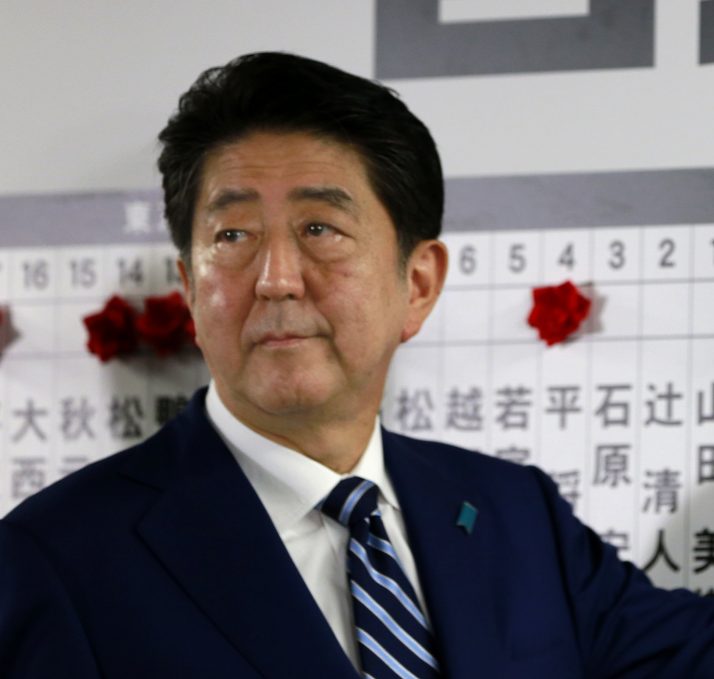BRUNSWICK — As expected, Japan’s incumbent Prime Minister Shinzo Abe led his conservative Liberal Democratic Party to victory in last Sunday’s elections to the national parliament. The result was not exactly a ringing endorsement of the LDP, which collected a mere 36 percent of the popular vote. However, thanks to a deeply divided opposition and an arcane electoral system, which favors incumbents, they and their junior coalition partner Komeito (The Clean Government Party) won just over two-thirds of the parliament seats, the threshold needed to pass constitutional amendments.
This “supermajority” is significant because Abe has pledged to revise Japan’s pacifist constitution, Article 9 of which forbids the use of military force. Many observers interpret talk of constitutional revision as a sign that Abe is hell-bent on nationalistic remilitarization.
In fact, the proposed amendment is almost comically tepid, simply recognizing the constitutionality of the Self Defense Force, Japan’s already sizable military. And even if this symbolic revision makes it through the parliament, it won’t become law unless it wins over 50 percent of a national referendum. With a majority of voters still supporting Article 9, that’s unlikely. Abe is often called hawkish, and by modern Japanese standards he is. But by the standards of most comparable countries, Japan follows one of the least aggressive, most pacifist foreign policies in the world. This election hasn’t changed that, which is good news for Americans as well as Japan’s East Asian neighbors.
The United States can continue to count on a loyal, compliant ally in a region beset with security nightmares and economic challenges. True, trade tensions have flared in the past, and may do so again if President Trump continues his protectionist “America first” policies. But Prime Minister Abe is unlikely to let trade friction get out of hand because he badly needs U.S. military and diplomatic support in the face of increased threats from North Korea and, arguably, China. Hence, although Abe had personally championed the Trans-Pacific Partnership trade agreement, he meekly acquiesed when President Trump walked away from the deal. Indeed, Abe is one of just a handful of world leaders who has not publicly clashed with the outspoken Trump. Whatever one’s views of either leader, a degree of continuity is welcome in this vital bilateral relationship.
For American observers, though, the most striking aspect of the election might be the complete lack of angry populism: There were no Japanese equivalents of Donald Trump or Bernie Sanders. The election campaign was short and ridiculously cheap by U.S. standards, with mostly civil, honest discourse. Why the absence of rancor? Chief among many reasons is simply good governance: Japan’s political establishment has succeeded in providing a solid measure of prosperity and security to most of the population.
The Liberal Democratic Party are “conservative” only relative to their opposition: Their policies are moderate and pragmatic, bearing little resemblance to, say, the neoliberal orthodoxy of Republicans. They are committed to maintaining universal healthcare and the pension system, and nurturing jobs, especially for the young. Strange as it sounds, youth voters were the most enthusiastic supporters of the supposedly fusty old Liberal Democratic Party, in part because this year 98 percent of students found jobs directly after graduating from university.
Abe campaigned on a platform of raising taxes in order to spend more on education, child care and increased nursing and medical care for the elderly. Some economists dismiss such policies as unsustainable, noting a ballooning government debt that stands at 250 percent of GDP, although the system has muddled along for decades. Politically, socially and morally, though, the approach seems to be working.
The Japanese live long, healthy lives. Children get an excellent public education wherever they live. Public transport is great. Social infrastructure from roads and bridges to libraries or cultural centers are functional and well-maintained. Crime rates are low. There’s no opioid crisis.
I don’t wish to oversimplify: there are many historical, cultural and social factors underlying these positive outcomes, and Japan certainly has its share of problems and failings. But as Sunday’s results underline, responsible governance and sensible, centrist policies are paying off.
Send questions/comments to the editors.



Comments are no longer available on this story